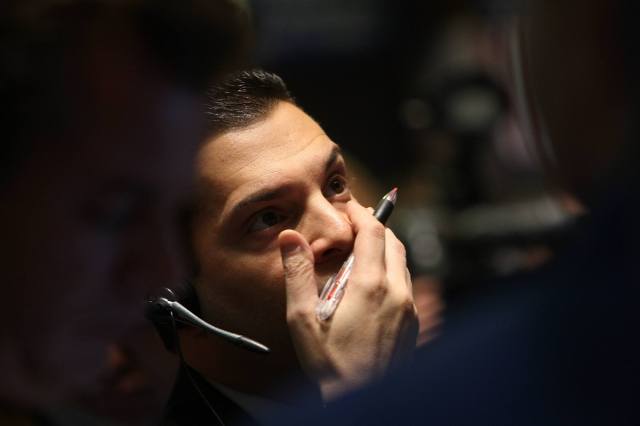Traders work on the floor of the New York Stock Exchange in October 2008. Credit: Spencer Platt / Getty

Unbelievably, it is a full decade since Lehman Brothers filed for bankruptcy – the event that sent global financial markets into a tailspin.
The crash was the ultimate demonstration of market failure – and, many would argue, the failure of free market ideology.
A particular bugbear is the ‘efficient-market hypothesis‘, which is the theory that asset prices fully reflect all available information. The fact that ten years ago the value of entire companies and asset classes collapsed overnight is surely proof that the hypothesis is wrong.
Except that depends on what you mean by ‘value’. More than two millennia before the hypothesis was formulated, Publilius Syrus said “Anything is worth what its purchaser will pay for it.”
In that respect, markets are never wrong. Indeed, modern markets have never been more right – because they gather information about more purchasers (and what they’re willing to pay) than ever before.
One can object that this is missing the point – and that what purchasers are willing to pay for something can become totally detached from any rational assessment of its ‘deeper’ value (however one might want to define that).
Fair enough. But were the people responsible for the stability of the global financial system oblivious to this reality?
No, says Sebastian Mallaby in the Washington Post. The idea that “blind faith in markets” stopped the likes of Al Greenspan (chairman of the Fed before the crash) from seeing the warning signs is itself deeply flawed:
“Contrary to myth, Greenspan himself never believed that markets were efficient. In his youth, he wrote lucidly about bubbles and crashes and regarded market inefficiencies as so obvious that he sought to exploit them by day trading… As Fed chairman years later, Greenspan frequently reminded his colleagues that periods of prosperity could be punctured by ‘irrational exuberance’ in financial markets.”
Mallaby puts the blame not on market failure, but state failure.
The fact than an extensive system of financial regulation existed before the crash indicated that policy-makers were well aware of the potential of markets to go haywire. The real problem was that the regulatory framework was not fit for purpose:
“…the reality [was] that political constraints, not intellectual failures, prevented policymakers from curbing the housing mania. Nobody remembers that in 2001 the Greenspan Fed banned the most abusive subprime mortgages, for the good reason that the ban was circumvented. But why was it circumvented? The answer is that the capture of Congress by financial lobbies ensured the balkanization of regulation into an alphabet soup of agencies, many of them underfunded and ineffective.”
Though the financial lobbyists were representing private sector interests, they were pushing at an open door: both literally in having the run of legislatures and government departments; but also metaphorically given the state’s addiction to debt as facilitated by the money markets.
And it wasn’t just in America, of course. In the UK, Gordon Brown’s ‘tripartite’ system of financial regulation also produced an “alphabet soup of agencies”. As for continental Europe, one only has to look at how Greece ‘qualified’ for Eurozone membership to recognise the extent of state complicity in the causes of the ensuing financial calamities.
Mallaby makes a number of excellent points, but that doesn’t mean we should absolve the theoreticians of all responsibility.
The politicians were never blind to the potential for market failure. Where governments and financial institutions did go wrong, however, was their unfounded degree of confidence in their ability to manage the consequent risks. As Nassim Nicholas Taleb warned at the time, the risk models the regulators and bankers relied upon were deeply flawed – and for that we can certainly blame the theoreticians.
Ten years on from the crash what should worry us isn’t the risk of market failure. That, like death and taxes, we can assume. What should keep us up at night is that the debt that magnifies those risks hasn’t gone way – and nor has the false confidence of the risk managers.










Join the discussion
Join like minded readers that support our journalism by becoming a paid subscriber
To join the discussion in the comments, become a paid subscriber.
Join like minded readers that support our journalism, read unlimited articles and enjoy other subscriber-only benefits.
Subscribe